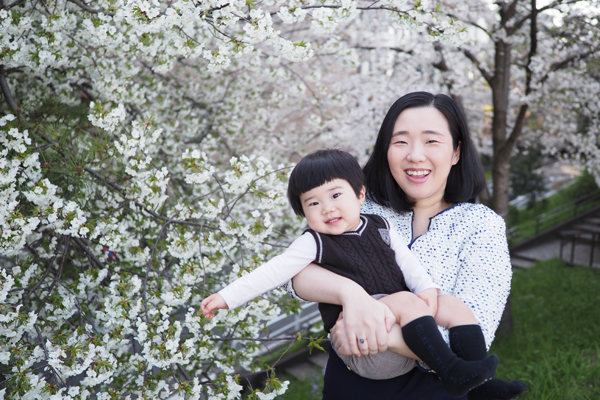Megahealth News
- 2021/03/27Vol.38 Beethoven and Fate
 My son one year and three months old. In front of full bloom Sakura (Cherry blossom).
My son one year and three months old. In front of full bloom Sakura (Cherry blossom).Now is the season of dancing Sakura. Due to Covid-19, cherry-blossom viewing party is under self-restraint, I hope you are spending the days blooming flowers in your heart.
The other day, I went to see Takarazuka Revue Company’s [f f f –Fortissimo– ~Sing in Joy!~ ]. Beyond expectation…it is rather odd to say, the content of the play corresponded perfectly with Shigyo Sosyu’s philosophical thought. I was greatly impressed with its extreme correspondence and uttered, “Yes, yes, that’s right!” myself. And so, I would like to introduce it to you.
【The following contains much story spoiler. So, if you do not want to know, please do not read this!】
*****
[Summary]
It is a story of Ludwig van Beethoven. Beethoven grew up in an unfortunate family from his childhood, and he grew up and gained fame as a musician, yet he lost his hearing, and also betrayed by his aristocrat lover. He was disappointed at last with once philosophically admired Napoleon I and Johann Wolfgang von Goethe, and also lost his first lover and unable to attend her deathbed. To such Beethoven’s ears, he just heard a mysterious woman’s voice, although she always stayed close by, yet he sensed her to be a bad-luck-bringer and thought her to be a nuisance. Mysterious woman appeared at gunpoint before Beethoven who lost everything and was in the chasm of despair. And she told him that she herself was the Misfortune and the lament of all humans from the past. She was not only with Beethoven but also with all the humans always. Then Beethoven embraced her and said that he comprehended she was “Fate,” and declared that he shall embrace and love Fate. Then, Fate purported by saying, “When Misfortune is loved, then it shall transform to Song of Joy,” and composed [Ode of Joy] with Beethoven. Ultimately, by loving Fate, he overcame his Misfortune and was able to express the supreme joy.*****
What is your impression? You who are deep reader of Shigyo Sosyu’s books must have sensed as such, “Yes, yes. I know! Fate certainly is like that! Beethoven also was likewise!
Yes. Fate of human, when it emerges it is a nuisance that does not proceed accordingly to the person’s desire, and in many cases it accompanies lament and grief, moreover it may give the person a sensation as if at gunpoint. Most people, as Beethoven did in the play, do not acknowledge her, and pay no attention to her advice and try to get rid of her. In spite of this situation, Fate is truly kind-hearted and she appears many times without the person realizing and encourages and continues to stay close to the person’s life. I wonder how many people are aware of this fact.
Here, I have one question to ask. “What is Shiawase (Good-fortune)?” Is it pleasure? Is it satisfaction?–– I do not think so. It is not temporary full contentment, but “Good-fortune” altogether of one’s whole life, is to accept in true meaning and love “Fate.” In fact this Fate embraces grief and lament of the person, and not only that but also of social and historical sorrow causing the person to be who one is, and this “Fate” nestles close and continue caring. And when comprehending and embracing that “Misfortune” such as grief and lament are not one’s enemy but a supporter, one is able to affirm all of one’s whole life.
At that moment, no doubt [Ode to Joy] must be echoing in our soul. In the play, angel was joyful together and it was gloriously expressed that the soul of Beethoven was called by Heaven. I also would like not to regard Misfortune as the enemy but by loving it, I wish to approach Good-fortune myself.My son 8 months old. Plays toy piano.
